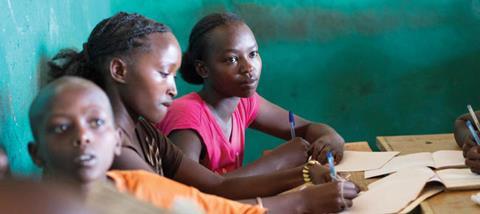
Elema Dulacha lives in rural Ethiopia among the Borana community. Widowed at a young age, Elema was congratulated by her neighbours when she managed to secure a husband for her 13-year-old daughter.
‘At the time I was so proud,’ she recalls. ‘I felt happy that I was able to give my girl away so early. She was crying about it, but my community all respected me; they thought I was very lucky. Back then there was no education about the dangers. I know now that I gave my daughter away when she was far too young for marriage.’
Elema’s daughter died during childbirth. ‘I feel terrible about what happened,’ she continues. ‘When I think back, I feel so sad. I always tell people the regret in my heart and about my…wrong decision.’
Throughout this traumatic time, Elema was sustained by her Christian faith. She was one of the first believers among her people and attends a Protestant church just outside her village. ‘I received Jesus as my saviour about 13 years ago,’ she says. ‘I have never lost sight of God…I speak with him all the time.’
Time for change
Elema has used this tragedy to effect change in her neighbourhood. In particular, she began to learn more about the dangers of girls marrying too young. Through the work of Hundee, a local organisation partnered with charity Christian Aid, she vowed to stop other young girls suffering the way her daughter had.
By the time 13-year-old Bokiya Gooloo came to her for help, Elema was prepared. After her older sister was killed by a drunk and violent man in her village, Bokiya was told by her family that she would have to marry her sister’s 60-year-old widower.
They took my clothes away because I refused to marry him
Aware that child marriage had recently been banned by the local authorities – thanks in no small part to Hundee’s work – Bokiya refused. ‘I didn’t want to do it,’ she says. ‘For one thing, he used to be my sister’s husband and [it’s] not a normal thing to do. I’m very young and I want to finish my education. I don’t want to die giving birth.’
However, in Borana culture, women are expected to do as they are told, so she knew there would be consequences to her refusal. ‘When you get married, the man gives your family some livestock,’ she explains. ‘I think the minimum is five cows. My family were interested in getting more cattle and they started harassing me. They took my shoes and all my clothes away because I refused to marry him. They stopped giving me soap or food.’
Desperate and lonely, Bokiya walked naked to Elema’s home in search of protection. ‘When Bokiya was here I had eight mouths to feed,’ recalls Elema. ‘It’s hard to take someone in when you’re already struggling to make ends meet, but Bokiya needed us. She arrived at my house naked and alone. We took her in and treated her as one of the family.’
The death of Elema’s daughter had changed her outlook for good, and she was able to empathise with Bokiya’s plight. ‘I have a bad scar about my past decisions, so whenever I can save one girl, that scar begins to heal a little,’ she says.
Bokiya eventually returned to her family, but life is still difficult. She says: ‘It is still a challenge with my family. They have bought me clothes and books for school, but my mum threatens that she will not buy them for next year and tells me I cannot refuse to get married again…It is Elema who buys me oil and a comb so I can do my hair. She gets me soap to wash my clothes. It’s Elema who helps me to go to school, and covers my expenses.’
Long-term transformation
Bokiya, who wants to be a doctor, has become a role model for her peers; many of whom have escaped child marriage themselves as a result.
Meanwhile, Elema has become a campaigner for social justice within her community. ‘I support people as much as I can. Not only through my money and my gifts, but also through the court system; through the local leaders and by organising the community against this. I do all this in memory of my daughter.
The realities of child marriage
Around 17% of all adolescent girls (aged 15 to 19) are currently married or in union
Bangladesh, Chad and the Central African Republic share the highest percentage of marriages involving children
Child marriage primarily involves girls, although in eight countries more than 10% of boys are married before they reach 18
For girls, child marriage can lead to early pregnancy, social isolation, interrupted schooling, reduced career options and an increased risk of domestic violence
Source: Unicef
‘We’ve recently stopped four child marriages. In one case the marriage agreement was already signed and we made them cancel it.’
Encouraged by her successes, Elema has set her sights on further hurdles faced by the women in the community. ‘We need to change the rules about widows’ inheritance. Girls should be able to inherit from their parents, especially if there are no boys. And we need to stop this practice of giving payment for a bride, which stops a woman from leaving her husband. You cannot buy a person; you can only buy a thing. Change is possible. We can make this happen.’
Although the Borana women continue to face huge challenges, attitudes and laws are beginning to change. Training workshops hosted by Hundee helped villagers identify for themselves the problems that were most harmful to women and, after two years of lobbying, the local authorities finally introduced three bans: on female genital mutilation, excessive drinking (often linked to violence) and marriages of under-18s. More than 100,000 people are now protected by these laws. Elema and Bokiya’s stories are proof that – by God’s grace and our action – change is possible.
Hundee’s work in Ethiopia is the focus of this year’s Christian Aid Week, which will take place from 10-16th May.
Joe Ware is church and campaigns journalist at Christian Aid.
Click here to request a free copy of Premier Christianity magazine




























